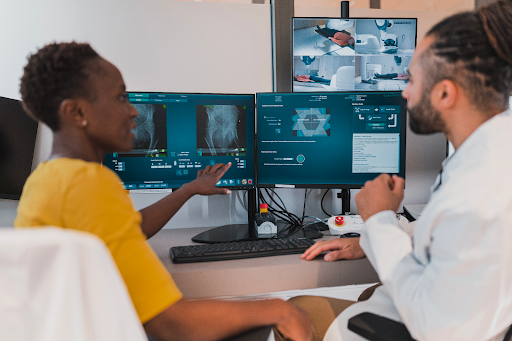Data has quickly become one of the most valuable currencies in the world. Armed with huge amounts of high-quality information, it’s no surprise that healthcare providers are able to uncover hidden insights, make transformational decisions, and improve patient outcomes. Even money can’t buy all that!
But how does mere patient-data translate into actionable clinical insight? Through predictive analytics: A powerful approach to statistical modeling that studies the past to forecast the future. Despite this, though, many care-providers are still neglecting to leverage all the information on their hands—and it could end up leaving massive patient-provider value on the table.
Let’s explore the predictive possibilities for data in healthcare.
Capturing Data With IoT
In order to conduct any form of meaningful analysis, one must first gather data to analyze. This has historically been the fundamental non-starter preventing healthcare professionals from leveraging predictive methods: A lack of high-quality information. However, that’s where Internet of Things (IoT) technology comes into play; with the unique ability to connect & interact with other networked systems, IoT-enabled sensors directly solve this issue by way of pure innovation, drastically streamlining the patient dataflow.
Whether it’s to track temperature, heart rate, blood pressure, or any other critical metric, IoT technology keeps you in the loop regarding your patient’s health.
Integrating With Digital Systems
However, all that information isn’t really useful until it has a place to go, bringing us to the next piece of the predictive puzzle: Unified healthcare IT systems. They’re especially useful when it comes to data management because they offer IoT-sensors a reliable place to dump all those measurements. Once they’ve entered the system, providers can begin uncovering clinical insight from patient-data like never before.
Diving Deep Into Predictive Methods
Now that we’ve understood how to collect & capture high volumes of patient-data, let’s turn it into actionable, patient-powered
Predictive analytics is a powerful statistical method aimed at forecasting key events and outcomes; with the right data, predictive analytics can unlock specialized value for patients, providers, as well as the broader healthcare ecosystem.
How They Work
These tools utilize machine learning (ML) and artificial intelligence (AI) in unison with IoT technology to deliver highly-specific recommendations. In fact, many analytical solutions are able to execute a robust scope of operations: Evaluate histories, make assumptions, run tests, and then use all of that analysis to predict the future—or even prescribe meaningful advice.
The best healthcare IT solutions will incorporate a variety of complex algorithms & fine-tuned models within provider-interface, enabling you to identify and learn from deep patient-trends that would otherwise go unseen.
Get Ahead of Clinical Uncertainty
With the ability to predict future outcomes, healthcare providers can proactively address potential issues before they become major problems. Predictive analytics can help identify patients at risk for certain conditions, allowing for early intervention and preventative care.
For example, by analyzing a patient’s medical history and current health status, predictive analytics can identify those at risk for chronic diseases such as diabetes and heart disease. This allows providers to take action and implement preventative measures, such as lifestyle changes and medication management, before the disease progresses.
Furthermore, predictive analytics can also help identify patients at risk for readmissions, allowing providers to take steps to prevent unnecessary hospital visits. By identifying patterns in patient data, predictive analytics can help providers create personalized care plans that are tailored to each patient’s unique needs.
Personalize Every Treatment Plan
Furthermore, predictive analytics can also revolutionize the way clinicians treat their patients, enabling providers to tailor-make each patient’s treatment plan to cater to their individual needs. This approach is in stark contrast to the traditional, universal treatment which offers a one-size-fits-all solution.
Personalized treatment is far more effective than generalized, blanket standards because it accepts one intrinsic fact about humans: Every patient is unique, with vastly different socioeconomic, personal, and medical histories. Even if you administer a universal solution, there’s no way to gauge how each individual’s body & health status will react to that treatment.
Using longitudinal & endogenous data, predictive analytics can help identify the specific needs of each patient, and create treatment plans that are tailored to their specialized needs. This is particularly impactful in the context of chronic disease management, where a one-size-fits-all approach is often not effective.
Optimize Your Processes To Focus on Patients
Predictive analytics is not just a tool to improve patient outcomes directly—it can also have a significant, positive impact on a healthcare team’s operational & administrative efficiency. By utilizing historical as well as real-time data in concert with advanced AI/ML models, predictive analytics can help professionals streamline their workflows, reduce latent costs, and ultimately drive more value to the patient.
One key provider process where predictive analytics is especially useful is resource planning. By forecasting patient volumes and staff needs based on empirical trends, hospitals can tweak their resource allocation to better meet true demands. Predictive methods can further be utilized in this context to predict patient flow through the hospital, identifying expected bottlenecks and potential delays.
The integration of predictive analytics in healthcare will undoubtedly revolutionize the industry. By leveraging IoT technology, globalized data management, and powerful machine learning, our solutions enable healthcare providers to uncover valuable insights that improve patient outcomes and bolster internal processes.
With Holon’s intelligent technology and human-centric design, we empower care teams with the ability to personalize treatment and proactively address risks—and in other words, promote better healthcare for tomorrow. It’s time to take advantage of the predictive possibilities of data to spark a positive shift within healthcare.


